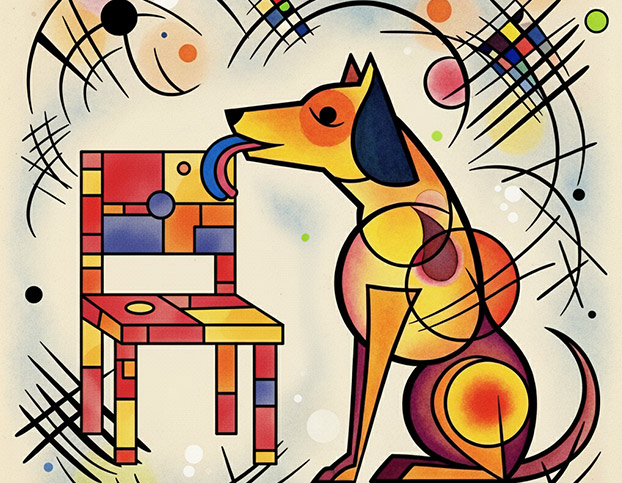It’s a familiar sight for many dog owners: your dog licking the couch, the floor, their bed, or even the air. While this behavior can be perplexing and annoying, it often signals an underlying issue. Understanding the root cause is important for your dog’s well-being.
Occasional licking is a normal part of how dogs explore their world. But what’s the difference between normal and compulsive licking? Compulsive licking is persistent, repetitive, and often difficult to interrupt. If you’ve noticed a sudden increase in the behavior or it’s happening for no clear reason, it’s time to investigate.
The causes of excessive licking can be sorted into two main categories: behavioral and medical.
Behavioral Roots of Licking
A significant part of excessive licking stems from a dog’s psychological or emotional state. These can include:
Exploration: For puppies especially, licking is a primary way to explore their environment. Their mouths and tongues are key tools for understanding textures, tastes, and the world around them.
Boredom and Lack of Stimulation: A dog left alone for long periods without adequate physical or mental exercise may resort to licking as a form of self-soothing or to simply pass the time.
Anxiety and Stress: Licking can be a displacement behavior for anxious or stressed dogs. The repetitive action can have a calming effect, similar to how a person might bite their nails. Triggers for anxiety can range from separation from their owner to loud noises or changes in their routine.
Attention-Seeking: If a dog learns that licking an object gets a reaction from their owner — even a negative one — they may continue the behavior to solicit attention.
Medical Reasons for the Licking Habit
It is essential to work closely with your vet to rule out any underlying health issues when a dog exhibits excessive or unusual licking behavior. Several medical conditions can present in this way:
Gastrointestinal (GI) Issues: This is one of the most common medical causes. In fact, excessively licking objects is one of the most common concerns clients express to us at Savannah Veterinary Internal Medicine when their dog has GI-related issues. Nausea, acid reflux, inflammatory bowel disease, pancreatitis, or other forms of GI discomfort can lead a dog to lick surfaces excessively in an attempt to alleviate the unpleasant sensation.
Allergies: Reaction to food and environmental allergens can result in excessive licking. In fact, licking the paws is a common sign of allergies in dogs.
Nutritional Deficiencies and Pica: A diet lacking in essential nutrients can sometimes lead to a condition called pica, which is the craving and consumption of non-food items. While more commonly associated with eating dirt or rocks, pica can also manifest as licking metallic or other objects in an attempt to obtain missing minerals, especially iron.
Dental and Oral Problems: Pain or discomfort in the mouth due to issues like periodontal disease, oral cancer, a foreign object lodged between the teeth or under the tongue, or an abscess can cause a dog to lick excessively.
Neurological Disorders: In some instances, excessive licking, particularly “fly-snapping” (licking the air as if catching imaginary flies) can be a sign of a focal seizure or other neurological condition. Cognitive dysfunction in older dogs can also present with repetitive behaviors like licking.
What to Do If Your Dog is Licking Inanimate Objects
If you notice a sudden onset or an increase in your dog’s licking behavior, it is advisable to consult with your veterinarian. They can perform a thorough examination to rule out any medical causes. Keeping a log of when the licking occurs, what objects are being licked, and any other concurrent behaviors can be helpful for diagnosis.
It is very important to rule out all medical causes before focusing on behavioral modification, which may involve:
Increasing Physical and Mental Stimulation: More walks, playtime, and puzzle toys can help alleviate boredom and anxiety.
Managing Anxiety: Identifying and minimizing stressors in the dog’s environment is key. In severe cases, a veterinarian or veterinary behaviorist may recommend anxiety-reducing medications or supplements.
Ignoring Attention-Seeking Behavior: If the licking is determined to be for attention, ignoring the behavior and rewarding calm, non-licking behavior can be effective.
Providing Appropriate Chew Toys: Redirecting the licking behavior to acceptable items like durable chew toys can be a helpful management strategy.
Lick, Lick, Lick, …
Your dog can’t tell you what’s wrong with words, but with a behavior like this, they’re communicating that something needs attention. A proper evaluation is the first step to uncovering the root cause and starting a treatment plan that brings comfort to your dog and peace and quiet back to your home.

Author:
James Woods DVM, MS, DACVIM (SAIM)
Ph: (912) 721-6410
Contact Us
